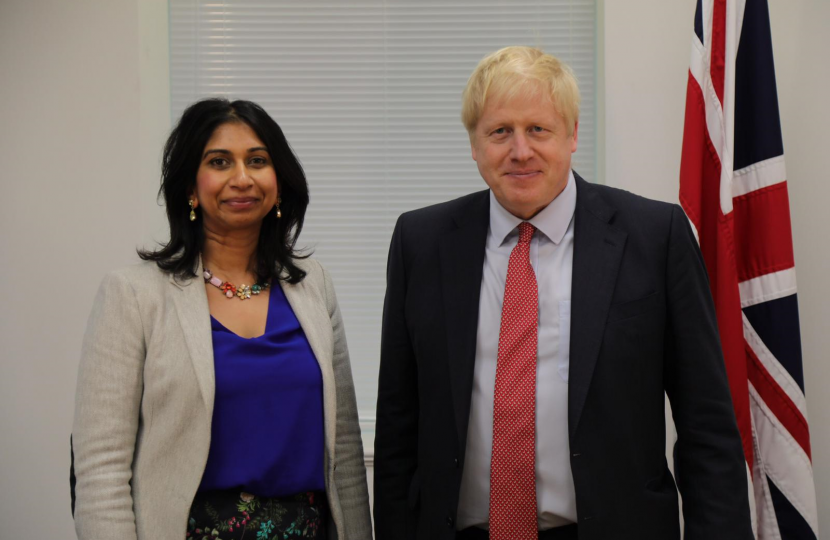Whenever a member of this government comes out with a new proposal on human rights or the courts, it can be easy to dismiss it as another ludicrous idea from a ludicrous government. But this is nothing, in and of itself, new. Ministers of every political stripe have long lamented the intrusion of the courts and the constraints of human rights, and yet the courts and human rights are still here. Even after Johnson’s government’s review of administrative law earlier in the year, the most meaningful change was to the workings of immigration tribunals – disappointing, but hardly devastating.
But it should be born in mind that this is a government – along with its predecessor – that took us out of the European Union without a viable economic alternative, that dismissed Parliament for political advantage, and that sought to combat a coronavirus pandemic with an influenza-modelled response. It is not a government averse to making stupid, pointless or anti-democratic decisions. So to suggest that Johnson and his authoritarian-minded apparatchiks will not attempt wholesale reform of judicial review or human rights because no government has previously done so is sweetly trusting, if not hopelessly ignorant.
Given the language of the Lord Chancellor, Dominic Raab, and the Attorney General, Suella Braverman, over the past few days, Johnson is either letting them go off on a fruitless frolic of their own, or there is genuine intent to bring about wholesale reform of judicial review. In an interview to the Sunday Telegraph, Raab set out his three main ambitions as Lord Chancellor: to reconsider judicial review ‘reform’, to ensure that the Supreme Court – not Strasbourg – has the ‘last word’ on human rights issues, and to ‘protect Parliament’ from the judiciary ‘legislating’, whether these judges are ‘abroad or indeed at home’.
This theme of ‘judicial legislation’ was continued in the Attorney General’s speech, which focussed heavily on what she perceived as being the politicisation of the courts, and how this politicisation is intruding on the sovereignty of Parliament. While Braverman seems to have spent quite a lot of time reading up on the relationship between the courts and the other governing branches, quoting extensively from public law luminaries throughout, she may have found her time was equally well – if not better – served by reading about the distribution of power between the executive and the legislative branch. In this vein, decisions like Miller I and Miller II (which required parliamentary consent for the UK to leave the EU and forbade Johnson from proroguing Parliament in order to prevent it from exercising its constitutional functions) are more properly seen as elevating Parliament in the constitutional hierarchy, with the courts emphasising its supremacy over the executive- regardless of whether the government has an overwhelming majority in the House of Commons or not.
The Attorney General may be right in that the decisions of the Supreme Court here ‘recast previously clear divisions between the justiciable and the non-justiciable’, but to suggest that they turned the constitution on its head, placing the courts above the legislature, is to fundamentally and disingenuously misread the constitutional implications of the judgment. And while she may bemoan the courts’ ‘radical departure from orthodox constitutional norms’, she may want to consider the log that is lodged firmly in her and her fellow ministers’ eyes before she begins accusing the judiciary of such a departure. As I have written previously, the more governments stray from constitutional norms and principles, the more courts must innovate to ensure that they are held in check. If the executive will venture onto virgin terrain, so the courts must follow.
Of course, it is always open to Parliament to pass legislation if truly disagrees with a decision of the courts. The courts have always been clear that if Parliament truly wants to trespass upon constitutional fundamentals, it is open to it to do so – absent the most egregious violations of constitutional norms – provided Parliament is willing to clearly acknowledge its desire to abridge the constitution in such a way. This was the case in Privacy International, where the Supreme Court refused to allow the executive the right to make decisions free from judicial scrutiny, particularly where the decisions are outside of the minister’s powers, or where they contain a mistake in law. The legislative language was not clear enough to justify such an abrogation of constitutional principle. Equally flawed is the notion that the executive should be given the power to overturn judicial decisions it disagrees with for any – or no – reason at all, an argument the Supreme Court rejected in Evans.
Concerningly, the government still seems to be looking longingly down this path. In his interview, Raab proposed legislation that would give government ministers the power to single-handedly overturn legislation they didn’t like. If Braverman and Raab would like to add to the extensive reading they have clearly been doing on the British constitution, they may want to consider the English Civil War and its emphatic conclusion that the monarch – and their government, no matter how popular or unpopular – is subject to the law and the constitution just like everyone else. Parliament giving the executive the unilateral right to overturn judicial decisions it disagrees with doesn’t vindicate parliamentary sovereignty. It eviscerates it.
The government – particularly one with a majority like Johnson’s – already has the power to overturn judicial decisions it doesn’t like. It is free to draft, introduce and pass legislation through Parliament. But this does not mean, as Braverman may desire, that Parliament can legislate as it wishes, or that there truly are no limits to legislative power. She quotes Lord Sumption’s Reith Lectures with approval, suggesting that we should not look to the legal branches to preserve our constitutional values, but to the political branches. As I argued in my review of Sumption’s lectures, he takes a naive perspective, one that rests on the ‘good chap’ theory of government, a philosophy that has been trampled upon and mauled, now a barely twitching corpse on the political battlefield. Our divisive politics means that principle is barely valued by the honourable members of the House of Commons. Partisan advantage is the only measure of success. Any truly principled House would have looked at the conduct of the prime minister and thrown him and his incompetent, malignant government out months ago. Yet still he remains.
Braverman may be of the view that judicial review is becoming politics by other means, but what is one person’s politics is another’s law – and it is not up to the government to decree where an issue falls. Exiling Shamima Begum to the desert of Syria, impoverishing single mothers with an unsuitable number of children, or emitting pollution that devastates children’s health may be decisions of the political branches, but they are no less the province of the judiciary for that reason alone. Braverman commends the Supreme Court for its seeming support of her ideology through its ‘return to a more conventional approach’. They would do well to read this speech and reconsider.







